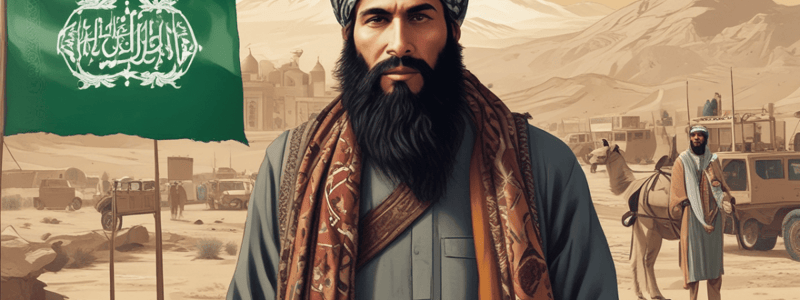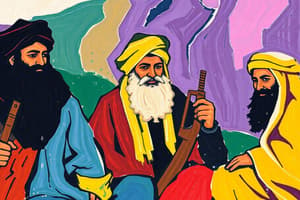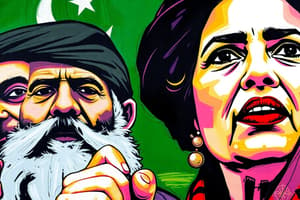Podcast
Questions and Answers
What was the total amount of U.S. foreign assistance promised to Pakistan for 2002-2003?
What was the total amount of U.S. foreign assistance promised to Pakistan for 2002-2003?
- $379 million
- $2.2 billion
- $600 million
- $1.2 billion (correct)
What was the purpose of the $600 million cash transfers given to Pakistan?
What was the purpose of the $600 million cash transfers given to Pakistan?
- To pay international debts (correct)
- To administer development aid
- To update and modernize its air force
- To reschedule a bilateral debt through the Paris Club
What type of aid was administered by the USAID?
What type of aid was administered by the USAID?
- Development aid (correct)
- Cash transfers
- Military and security aid
- Bilateral debt rescheduling
What was the amount of bilateral debt rescheduled through the Paris Club?
What was the amount of bilateral debt rescheduled through the Paris Club?
What was the purpose of the military and security aid given to Pakistan?
What was the purpose of the military and security aid given to Pakistan?
What was the significance of the economic foreign assistance given to Pakistan?
What was the significance of the economic foreign assistance given to Pakistan?
What was the main objective of the cash transfers given to Pakistan?
What was the main objective of the cash transfers given to Pakistan?
What was the role of USAID in the economic foreign assistance given to Pakistan?
What was the role of USAID in the economic foreign assistance given to Pakistan?
What was the amount of development aid administered by USAID?
What was the amount of development aid administered by USAID?
What was the purpose of the military and security aid given to Pakistan's air force?
What was the purpose of the military and security aid given to Pakistan's air force?
Flashcards are hidden until you start studying
Study Notes
Pakistan and Terrorism: An Unholy Alliance
- Pakistan has a history of supporting the Taliban in Afghanistan and terrorist organizations in Indian-administered Jammu and Kashmir.
- After 9/11, Pakistan became a key strategic partner in the US War on Terror, taking a U-turn in its foreign policy towards Afghanistan and Jammu and Kashmir.
Jihadi Groups
- There are several types of militant groups operating in and from Pakistan, distinguished by their sectarian background (Ahl-e-Hadith, Deobandi, Jamaat-e-Islami) and areas of operation (Afghanistan, India, Pakistan).
- The objectives of these groups vary from overthrowing the Pakistani government to seizing Indian-administered Jammu and Kashmir or supporting the Afghan Taliban.
Jihad Training
- There are six stages of jihad training, taking around 18 months to complete, which include:
- Tasis (indoctrination, 1 month)
- Al Ra'ad (indoctrination and military training, 3 months)
- Guerrilla training (6 months)
- Doshka (handheld weapons training, 7-10 days)
- Jandla (automatic arms and explosives training, 9 months)
- Domela and Zakazak (specialized training, optional)
Al Qaeda
- Al Qaeda operates in Pakistan through networks of supportive Pakistani militant groups, including Deobandi groups like the Pakistani Taliban, Jaish-e-Mohammad, and Lashkar-e-Taiba.
- Al Qaeda's objectives include the establishment of an Islamic Caliphate and the facilitation of attacks within Pakistan and internationally.
Taliban
- The Taliban emerged in Pakistan's Federally Administered Tribal Areas (FATA) and parts of the Khyber Pakhtunkhwa province after 9/11.
- Their objectives include waging war in Afghanistan against NATO forces and promoting Islamization in FATA.
Jamaat-e-Islami
- Jamaat-e-Islami is an Islamic political party founded in 1941 by Maulana Abul Ala Maududi.
- Its objectives include making Pakistan an Islamic state governed by Sharia Law.
- Jamaat-e-Islami has been linked to militancy and has supported the Afghan Mujahideen and the Kashmir insurgency.
Hizb-ul-Mujahideen
- Hizb-ul-Mujahideen was formed in 1989 by Muhammad Ahsan Dar and is committed to uniting Indian-administered Jammu and Kashmir with Pakistan.
- It follows the Jamaat-e-Islami ideology and is funded by Jamaat-e-Islami.
- Hizb-ul-Mujahideen is headquartered in Muzaffarabad, Pakistan-administered Jammu and Kashmir, and has recruited many members from the Kashmir Valley.
Lashkar-e-Taiba
- Lashkar-e-Taiba was founded in the mid-1980s by Hafiz Muhammad Saeed and is the militant wing of the Markaz Dawa-ul-Irshad.
- It is an Ahl-e-Hadith group that operates in Pakistan and the Kashmir Valley.
- Lashkar-e-Taiba's objectives include establishing an Islamic Caliphate in South Asia and "liberating" Muslims in Indian-administered Jammu and Kashmir.
Jaish-e-Mohammad
- Jaish-e-Mohammad was formed in 2000 by Maulana Masood Azhar.
- It advocates a pan-Islamic ideology that is anti-West and anti-Jew.
- Jaish-e-Mohammad's objectives include uniting Indian-administered Kashmir with Pakistan.
Smaller Groups
- Other smaller groups, such as Al-Umar, Al-Badr, and Jamiat-ul-Mujahideen, follow the same ideology as Hizb-ul-Mujahideen, Jaish-e-Mohammad, and Lashkar-e-Taiba.
- They aim to unite Jammu and Kashmir with Pakistan and promote hard-line Islamic ideas.
Sipah-e-Sahaba Pakistan
- Sipah-e-Sahaba Pakistan is a leading Sunni Deobandi group in Pakistan that aims to make Pakistan a Sunni State under a narrow interpretation of Hanafi Islam.
- It was banned in 2002 and again in 2012, but the ban was lifted in 2014.
Lashkar-e-Jhangvi
- Lashkar-e-Jhangvi is a radical militant offshoot of Sipah-e-Sahaba Pakistan formed in 1996.
- It seeks to further the goals of Sipah-e-Sahaba Pakistan, including marginalizing Shias and turning Pakistan into a Sunni State.
Harkat-ul-Mujahideen
- Harkat-ul-Mujahideen was formed in 1985 as a splinter faction of Harakat-ul-Jihad-i-Islami.
- It is primarily focused on the conflict in Kashmir and conducts trainings in Pakistan.
Tehrik-i-Taliban Pakistan (TTP)
- TTP is the Pakistani Taliban, formed in 2004 in Waziristan, Pakistan.
- It is a Pashtun insurgency, but also includes Punjab-based groups like Sipah-e-Sahaba Pakistan and Lashkar-e-Jhangvi, which provide suicide bombers and logistical support.### TTP and Muttahida Jihad Council
- The Tehrik-i-Taliban Pakistan (TTP) aims to overthrow the secular Pakistani government and establish a Taliban regime and the Islamic Emirate of Pakistan.
- The TTP receives support from high-ranking retired officers in the Pakistani Inter-Services Intelligence (ISI).
- The TTP is specialized in various terrorist activities, including IEDs, suicide attacks, mass casualty bombings, and more.
Muttahida Jihad Council (MJC)
- The MJC is an umbrella organization of 13 jihadi outfits formed by Pakistan.
- It was created in 1994 to control jihadi activities in Indian Administered Jammu and Kashmir.
- The MJC is headed by Syed Salahuddin, the leader of Hizb-ul-Mujahideen.
- The MJC's objective is to incorporate Jammu and Kashmir into Pakistan.
ISIS Influence in Pakistan
- The Islamic State of Iraq and the Levant (ISIS) is a terrorist organization that follows a fundamentalist, Wahhabi doctrine of Sunni Islam.
- ISIS has been designated a terrorist organization by the United Nations.
- ISIS originated in 1999 and gained prominence in 2014 when it drove Iraqi government forces out of key cities.
- ISIS has created an ideological space in Pakistan by creating divisions between existing militant Islamist groups.
- ISIS has followers, sympathizers, and links with many banned militant groups in Pakistan.
Afghan-Soviet War
- The Soviet Army invaded Afghanistan in 1979 to support the Communist government.
- The Soviet occupation lasted until 1989.
- The Afghan resistance was supported by Pakistan, which provided a conducive atmosphere for the Afghan Mujahideen to organize military operations.
- Pakistan's involvement in the war was motivated by geostrategic and domestic imperatives, including the possibility of facing a coordinated communist attack from Afghan and Soviet troops.
Afghan Mujahideen and Kashmir
- After the Soviet withdrawal from Afghanistan, the Afghan Mujahideen were sent to Kashmir to convert a political movement into a religious war.
- Pakistan used the same tactics and indoctrination that produced Mujahideen for fighting against the Soviet troops in Afghanistan.
- The insurgency in Kashmir was taken over by Islamist radicals and foreign mercenaries as part of Pakistan's strategy.
- Pakistan's strategy was successful in injecting a communal ideology, converting a political issue into a religious one, and tampering with the social fabric of Jammu and Kashmir.
Pakistan Military – ISI – Terrorist Nexus
- The ISI has been covertly running military intelligence programs in Afghanistan since the 1980s.
- The ISI coordinated the conduit and distribution of arms and financial means to terrorist groups in Afghanistan.
- The ISI's strategy is to use militant Islamic groups to achieve its objectives, including supporting the Taliban in Afghanistan.
- The ISI has given the Afghan Taliban sanctuary inside Pakistan and supported its resurgence in Afghanistan after 9/11.### ISI and Taliban Connection
- Sirajuddin Haqqani, the current leader of the Haqqani network, effectively organizes tribal and insurgent groups in southern Pakistan's Federally Administered Tribal Areas, aligning with Pakistani government interests.
- A 2012 NATO study concluded that the ISI provided safe havens to the Taliban, monitored their movements, manipulated their fighters, and arrested those thought to be uncooperative.
Al Qaeda in Pakistan
- Al Qaeda is believed to maintain camps in western Pakistan, where foreign extremists receive training in terrorist operations.
- Former Pakistani Army Chief General Ziauddin Butt revealed that Osama bin Laden was hidden in Abbottabad with the full knowledge of Pervez Musharraf.
Pakistan's Role in Jammu and Kashmir
- Pakistan has been a significant force behind the growth of Islamic radicalism and extremism in Jammu and Kashmir.
- The US State Department's report on Patterns of Global Terrorism identified Islamabad as the chief sponsor of militant groups fighting in Indian Administered Jammu and Kashmir.
- Terrorist groups such as HM, LeT, Al Badr, and JeM, currently fighting in Kashmir, benefit from Pakistani support.
- The ISI provides training, logistics, financial, and doctrinal support to these groups.
ISI's Involvement in Terrorist Activities
- The ISI has fundamentally altered the dimensions of the conflict in Kashmir by transforming it into a movement carried out by foreign militants on Pan-Islamic religious terms.
- The ISI has been involved in running military intelligence programs in India, supplying arms to insurgents in North-East India, supporting pro-Khalistan terrorist groups in Punjab, and actively printing and supplying counterfeit Indian currency notes.
- The ISI has allegedly been involved in terrorist attacks such as the 1993 Mumbai bombing, 2008 Mumbai attacks, and attacks in Pathankot and Uri.
9/11 and the US War on Terror
- The 9/11 attacks resulted in mass death and devastation, killing over 3000 people, including more than 400 police officers and 343 firefighters.
- President George Bush launched an international military campaign, declaring a worldwide "War on Terror."
- Pakistan was declared a "front-line" State in America's War on Terror, owing to its geostrategic position and diplomatic relations with the Taliban regime.
Pakistan's Involvement in the US War on Terror
- Pakistan was instructed to intercept Al Qaeda operations in its territory, cut off all arms shipments and logistic support to Taliban, and provide intelligence sharing and immigration information.
- Pakistan was also asked to eradicate all terrorist movements in Pakistan against the US and its allies, provide harbors to US aircraft, and provide territorial access for military and intelligence operations.
- In return, Pakistan received substantial economic dividends, military support, and boosted its reputation in the international community.
US Aid to Pakistan
- The US offered numerous political and financial rewards to Pakistan's regime after it joined the US in its campaign against terrorism.
- The US lifted sanctions against Pakistan, including the Symington Amendment, the Pressler Amendment, and the Glenn Amendment.
- The US provided approximately $1.2 billion in foreign assistance to Pakistan for 2002-2003, including development aid and cash transfers to pay international debts.
- The US also promised military and security aid to Pakistan to update and modernize its air force.
Studying That Suits You
Use AI to generate personalized quizzes and flashcards to suit your learning preferences.




